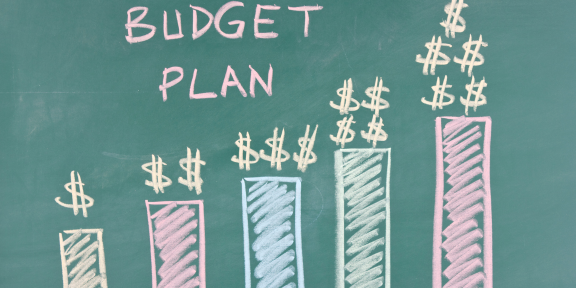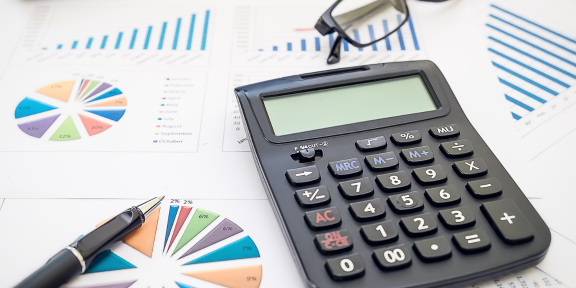Why do you need a budget? Seems like just another thing you have to keep track of in your busy life. I’ve seen firsthand how a budget can transform a person’s financial life. Now, I know what you’re thinking – ‘Budgets are restrictive and boring.’ But let me tell you, that’s a common misconception.
In reality, a budget is like a financial GPS, guiding you to your financial goals and helping you avoid those pesky money potholes along the way. It’s not about limiting your freedom; it’s about creating financial freedom. Having a budget helps you understand where your money is going, sets you on the path to achieving your financial dreams, and gives you peace of mind.
Let’s dive into the top 10 reasons why you need a budget

1. You Need a Budget for Understanding Your Money
A budget helps you understand where your money is going. It’s like a roadmap for your finances, showing you what you’re spending on and where you might be able to save.
Think of your budget as your personal financial roadmap. It’s not about telling you what you can’t do, but rather showing you the path to what you can achieve.
When you create a budget, you’re essentially mapping out your income and expenses. You get to see where every dollar is going – whether it’s towards necessities like rent and groceries, or fun stuff like movies and dining out.
And here’s the kicker: once you see where your money is going, you might spot areas where you’re overspending. Maybe you didn’t realize how much those daily coffee shop visits were adding up, or how much you’re shelling out for streaming services each month.
By understanding your spending habits, a budget can help you identify where you can save, putting you back in the driver’s seat of your financial journey.”
2. You Need a Budget for Setting Financial Goals
Whether you’re saving for a vacation, a new car, or your retirement, a budget is a tool that can help you reach those goals. It allows you to plan how much you need to save and keep track of your progress.
We all have dreams, right? Maybe you’re dreaming of a sun-soaked vacation, a shiny new car, or a comfortable retirement. Well, a budget is your best friend when it comes to turning those dreams into reality.
Here’s how it works: a budget helps you figure out how much you need to save for each goal. It’s like a financial planner that helps you break down your big goals into manageable monthly or weekly savings. And the best part? You can track your progress. Each time you set money aside, you’re taking a step closer to your goal.
It’s incredibly satisfying to see your savings grow and know that you’re making your dreams happen. So, whether your goal is big or small, a budget is the tool that can help you get there.

3. You Need a Budget to Preventing Overspending
Without a budget, it’s easy to spend more than you realize. A budget keeps you in check and ensures you’re living within your means.
It’s all too easy to swipe that credit card one too many times or indulge in a little too much online shopping. Before you know it, you’ve spent more than you intended. That’s where a budget comes in.
Think of it as your personal financial coach, keeping you in line and making sure you’re living within your means. It helps you allocate your income to different categories – like bills, groceries, entertainment, and savings – and sets limits on how much you can spend in each area. This way, you know exactly how much you can afford to spend without dipping into money reserved for other things.
It’s like having a financial safety net, preventing you from falling into the trap of overspending. So, if you’ve ever found yourself surprised by your credit card bill at the end of the month, a budget could be the solution you need.”
4. You Need a Budget to Reducing Stress
I know it seems backward, but really money-related stress can be reduced with a budget. Knowing exactly where your money is going can provide a sense of control and peace of mind.
Especially when it comes to money, stress can be a real downer. The uncertainty of not knowing where your money is going or if you’ll have enough to cover your bills can keep you up at night.
But here’s the good news: a budget can be a powerful stress-buster. When you have a budget, you know exactly where your money is going. You know how much you have for groceries, how much for rent, and how much for a little fun. It’s like having a clear picture of your financial landscape, which can give you a sense of control and peace of mind.
No more guessing or worrying – just clear, confident decisions about your money. So, if you’re looking to reduce financial stress, creating a budget is a great place to start.”
5. You Need a Budget for Avoiding Debt
Budgeting helps you avoid spending money you don’t have, which can prevent you from falling into debt. If you’re already in debt, a budget can help you formulate a plan to get out of it.
Debt can feel like a heavy weight, dragging you down and holding you back from your financial goals. But here’s the thing: a budget can be a powerful tool in your fight against debt. By helping you live within your means, a budget ensures you’re not spending money you don’t have, which is a key step in avoiding debt.
But what if you’re already in debt? Well, a budget can help with that too. It can help you formulate a plan to pay off your debt, by showing you how much you can realistically put towards your debt each month. It’s like having a personalized debt repayment plan, guiding you step by step towards a debt-free life.
So, whether you’re trying to avoid debt or working to get out of it, a budget can be your best ally.

6. You Need a Budget for Preparing for Emergencies
Have you ever had scrounge for money to fix a tire or get a new fridge? Life is full of surprises, and not all of them are pleasant. A budget allows you to set aside money for unexpected expenses, like car repairs or medical bills.
Let’s talk about something we all know too well – life’s unexpected surprises. And I’m not talking about surprise parties or unexpected gifts. I’m talking about the not-so-fun surprises, like a car that suddenly needs repairs or an unexpected medical bill. These surprises can throw a wrench in your finances if you’re not prepared.
That’s where a budget comes in. A good budget includes a category for emergency savings – money set aside specifically for these unexpected expenses. It’s like having a financial safety net, ready to catch you when life throws you a curveball.
So, instead of panicking when an unexpected expense comes up, you can rest easy knowing you’ve got it covered. That’s the power of a budget.
7. You Need a Budget for Improving Spending Habits
A budget can highlight bad spending habits. Maybe you’re spending more on dining out or online shopping than you thought. Recognizing these habits is the first step to changing them.
We all have areas where we tend to splurge a bit, whether it’s dining out, online shopping, or maybe those fancy coffee drinks. And that’s okay! The problem arises when we spend more on these things than we realize, and it starts to impact our financial health.
This is where a budget comes into play. By tracking your income and expenses, a budget can highlight areas where you might be overspending. It’s like having a financial mirror, showing you exactly where your money is going. And once you see these habits clearly, you can start to change them. Maybe you decide to cook at home more often, or limit online shopping to once a month.
Recognizing these habits is the first step to improving them, and a budget is the tool that can help you do that.

8. You Need a Budget for Planning for the Future
A budget isn’t just about managing your money now. It’s also about planning for the future. Budgeting can help you start saving for retirement, your children’s education, or other long-term goals.
A budget isn’t just about managing your money today; it’s also about planning for tomorrow. Think about your long-term goals. Maybe you dream of retiring early, sending your kids to college, or buying a home. T
hese goals might seem far off and daunting, but a budget can help bring them within reach. By setting aside a portion of your income for these long-term goals, you’re essentially paying your future self. It’s like planting seeds today for a harvest in the future. And over time, you’ll be amazed at how those savings grow and bring you closer to your goals.
So, if you’ve got big dreams for the future, a budget is the tool that can help you make them a reality.
9. You Need a Budget to Increase Financial Independence
A budget can help you build wealth over time, leading to financial independence. This means having the freedom to make choices that aren’t dictated by your financial situation.
This is the freedom to make choices that aren’t dictated by your financial situation. It’s about having the financial stability to do the things you love, whether that’s traveling the world, starting your own business, or simply enjoying a stress-free retirement.
So, how can a budget help you achieve this? By helping you build wealth over time. A budget encourages you to live within your means and save for the future. It’s like a personal trainer for your finances, pushing you to strengthen your savings and cut the fat from your expenses. Over time, these small changes can add up to big wealth. And with wealth comes financial independence.
If you dream of a life where money is a tool, not a constraint, a budget is a key step on that journey.
10. You Need a Budget for Creating a Healthy Financial Lifestyle
Ultimately, budgeting promotes a healthier financial lifestyle. It encourages you to take charge of your finances, make informed decisions, and build a secure financial future.
Just like a balanced diet and regular exercise contribute to physical health, a budget contributes to financial health. It encourages you to take charge of your finances, make informed decisions, and build a secure financial future.
It’s about more than just numbers on a spreadsheet; it’s about developing habits that will serve you well for a lifetime. With a budget, you’re not just reacting to financial surprises; you’re proactively managing your money. You’re making choices today that will lead to a healthier financial future. And over time, these choices can lead to less stress, more freedom, and greater financial security.
If you’re looking to create a healthier financial lifestyle, a budget is a great place to start.”

Wrap Up
So there you have it! We’ve journeyed together through the world of budgeting, and I hope you’ve seen just how powerful a tool it can be.
From understanding your money to setting financial goals, from preventing overspending to reducing stress, a budget touches every aspect of your financial life. It’s your roadmap to financial independence and a healthier financial lifestyle.
Remember, a budget isn’t about restriction; it’s about freedom – you need a budget to have the freedom to make informed decisions, to plan for the future, and to live within your means.
If you’re ready to take control of your finances, why not give budgeting a try? It might just be the best financial decision you ever make. If you need a tool to help you budget, read our review of You Need a Budget (YNAB). Here’s to your financial journey!
FAQ
1. What exactly is a budget?
A budget is a plan for your money. It’s a way to keep track of your income and expenses, so you know where your money is going and can make informed decisions.
2. Isn’t budgeting just for people who don’t make a lot of money?
Not at all! No matter how much money you make, a budget can help you manage it better. It’s a tool for everyone, not just those with limited income.
3. Doesn’t budgeting mean I can’t have fun or buy the things I want?
Actually, it’s the opposite. A budget helps you plan for fun and purchases. It ensures you have money set aside for the things you enjoy, without neglecting your bills or savings.
4. How do I start a budget?
Starting a budget involves three main steps: figuring out your income, tracking your expenses, and setting financial goals. From there, you allocate your income to different categories and adjust as needed.
5. What if my income or expenses change?
That’s the beauty of a budget – it’s flexible! If your income or expenses change, you can adjust your budget to match. It’s a living document that changes with your life.
6. How can a budget help me save money?
A budget can help you save money by highlighting areas where you might be overspending. It also helps you set savings goals and track your progress towards them.
7. What should I do if I’m having trouble sticking to my budget?
If you’re having trouble sticking to your budget, it might be time to revisit it. Maybe your budget isn’t realistic, or maybe your financial goals have changed. Remember, it’s okay to adjust your budget as needed.
8. How can a budget help me get out of debt?
A budget can help you get out of debt by showing you how much money you can put towards debt repayment each month. It can also prevent you from accruing more debt by helping you live within your means.
9. What’s the best way to track my budget?
There are many ways to track your budget, from pen and paper to budgeting apps. The best method is the one that works for you and that you’ll stick with.
10. Can budgeting really make a big difference in my financial life?
Absolutely! Budgeting can transform your financial life by giving you control over your money. It’s a powerful tool for achieving financial goals and building a secure financial future.
Personal Development Unlimited is your go-to place to be You, Without Limits. We bring together personal development and self-improvement articles, books, courses and videos in one place. Find your self-growth opportunities easily.
Comments
0 comments



